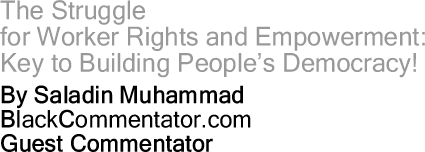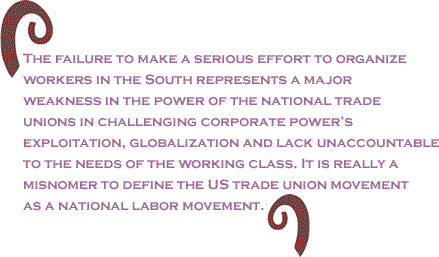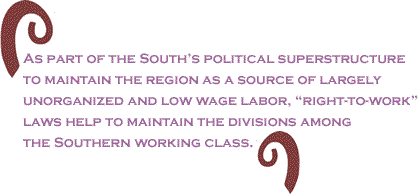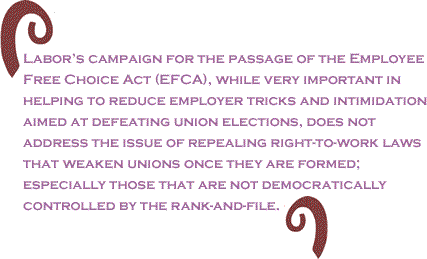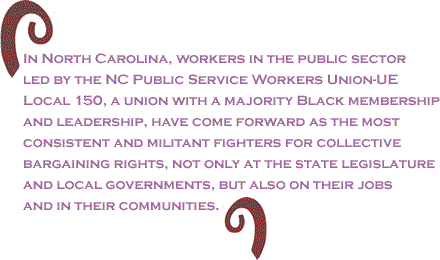
|
||||||||||||||||||||||
|
||||
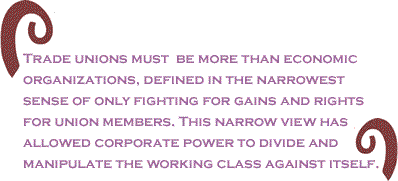 |
||||
The following is a speech by Saladin Muhammad given on November 5, 2009 at the commemoration of the 30th Anniversary of Greensboro Massacre where 5 members of the Communist Workers Party were killed. The speech was presented at the New Life Baptist Church in Greensboro, North Carolina. Thank you for inviting the Black Workers For Justice to participate in this 30th Anniversary Commemoration of the Greensboro Massacre and the Communist Workers Party (CWP) 5. In our struggles for justice and a better society and world, the struggle against racism must be given high priority. Whatever their tactical mistakes; and we all make them, the CWP 5 must be counted as heroes in the struggle for a better world. Their mission and actions were courageous and honorable. Workers today are faced with a list of issues that require learning past lessons; new and creative thinking and actions; and a greater involvement and leadership by the rank-and-file of the unions, worker and community organizations. There needs to be a better understanding of the connections between workplace and community issues; and local and global issues. Questions of race, gender, immigration, sexuality, religion and war have all become issues impacting working and living conditions and shaping worker consciousness. Trade unions must therefore be more than economic organizations, defined in the narrowest sense of only fighting for gains and rights for union members. This narrow view has allowed corporate power to divide and manipulate the working class against itself. The total national union membership is about 12 percent of the employed workforce; 5.9 percent in the Southern region; and slightly above 3 percent in North Carolina. New York State has more union members than the 12 Southern states combined. More than half of the national union membership, about 8 million are located in 6 states, all outside of the South. The failure to make a serious effort to organize workers in the South represents a major weakness in the power of the national trade unions in challenging corporate power´┐Żs exploitation, globalization and lack unaccountable to the needs of the working class. It is really a misnomer to define the US trade union movement as a national labor movement. The labor laws that were won by the US working class have always been weak to non effective in the South. Those that have been imposed by corporate power like the Taft Hartley Act in 1947 were made worst in the South by ´┐Żright-to-work´┐Ż laws, a section of Taft Hartley that was demanded by Southern states.
´┐ŻRight-to-work´┐Ż laws were enacted in most Southern states during the Jim Crow Period in the late 1940s and 1950s, when Black people were denied the right to vote and when racist Southern Apartheid shaped the social and political character and application of all laws. As part of the South´┐Żs political superstructure to maintain the region as a source of largely unorganized and low wage labor, ´┐Żright-to-work´┐Ż laws help to maintain the divisions among the Southern working class. These laws provide a framework for employers to encourage workers in the private sector to refuse to join unions even though they participated in government supervised votes where the majority voted in favor of union recognition. In most cases, the divisions breakdown along racial lines, where white workers are often told (unofficially) that they would maintain their privileges if they refused to join the union. Labor´┐Żs campaign for the passage of the Employee Free Choice Act (EFCA), while very important in helping to reduce employer tricks and intimidation aimed at defeating union elections, does not address the issue of repealing right-to-work laws that weaken unions once they are formed; especially those that are not democratically controlled by the rank-and-file. The failure of trade unions to make repeal of ´┐Żright-to-work´┐Ż laws as a major demand, makes no sense, especially since the loss of union members in manufacturing over the past 40 years, has been largely the result of corporate relocation of plants to the South. ´┐ŻRight-to-work´┐Ż laws have also allowed states to deny public sector workers the right to collective bargaining. North Carolina and Virginia have the worst laws denying this right; but all Southern states deny public workers this right in varying degrees and methods. In North Carolina, this means that more than 630,000 public workers have no rights to have effective input in shaping decisions that impact their working conditions, wages and rights on the job. As public sector workers are the providers of the public services received by working class communities in particular and other sections of society; the lack of collective bargaining rights is directly connected to the quality and availability of public services.
The UE150 members seeing how the denial of collective bargaining rights help to continue the conditions of race and gender discrimination in their workplaces, led them to refer to the law that bans collective bargaining rights - NC General Statute 95-98, as a ´┐ŻJim Crow´┐Ż law. For awhile other trade unions involved in coalition efforts to repeal NC GS 95-98 were reluctant to label it a ´┐ŻJim Crow´┐Ż law; fearing that whites would not unite with this struggle. However, this is changing, as demonstrated by the powerful comments made at this gathering by the President of the NC State AFL-CIO. Viewing ´┐Żright-to-work´┐Ż laws in the South as a holdover from the Jim Crow Period is very important in shaping an understanding of institutionalized racism; how it maintains the super-exploitation of Black and women workers; and how it divides and weakens the US working class. The struggle for collective bargaining rights for public sector workers in the South can begin to build a movement that organizes, empowers and radicalizes thousands of workers and their communities as part of a social movement for Peoples democratic power. It can build the mass working class base and political consciousness, to fight for repeal of ´┐Żright-to-work´┐Ż laws as the opening phase of a national movement to repeal Taft Hartley. Union organizing in the South thus requires a struggle for the anti-racist unity of the working class at the workplace as well as throughout society. It means that labor unions must be part of and accountable to a broad social movement and agenda that redefines and builds peoples democracy, including challenging certain capitalist institutional, ideological, cultural and political norms and policies that place profits over human needs.
What we are seeing today with the bailout of the banks and big corporations ´┐Ż is the core principles of capitalism; the placing of the interests of corporate profits over human needs. Hundreds of billions from the government (the public funds) can be so quickly and easily transferred to banks and corporations that make huge profits off the labor, housing, food, education, prisons, disasters and anything one could think of in society. Yet, no funds can be found to address the vital needs of the masses of working class people. The working class and oppressed communities however, are told to tighten our belts by sacrificing our homes, jobs, safety at the workplace, the environment of our communities, our children´┐Żs education, and to be patriotic by sending our daughters and sons to wars in the name of democracy ´┐Ż spelled corporate profits. One of the greatest fears of workers in US is the loss of jobs or income. When the threat of job loss is made to workers, they envision their whole world crumbling around them. Without power to challenge this threat, the boss holds the upper hand, not only over the worker´┐Żs life on the job, but over their social and political consciousness and choices throughout society. It is the major cause of stress for working class families. For many working class single women with children, whose social independence is partly linked to them having a job; the economic crisis is forcing them to go back into abusive relationships to support themselves and families. For oppressed nationality workers whose communities continue to be criminalized by the mainstream media and the crime bills introduced and enacted by the US Congress, there is a constant fear of being left out of, and or further marginalized in what is being promoted as a US economic recovery plan. Even worse, many fear a climate of increased violence by the state, and from racist groups and mobs now forming with the open financial support of big corporations. The election of Barack Obama as US president was an indication that white workers can be moved to break with racism. Although not supported by a majority of the white working class; unions were an important part of winning the minority that helped to elect Obama. However, the trade union struggle against racism must not be limited to the electoral arena and the courts.
The struggle for labor rights must be elevated to the level of human rights. The working class, which constitutes the majority of the US and world´┐Żs people, need labor unions to help wage the struggles against racism and all forms of discrimination; for democracy, working class power, women´┐Żs emancipation and social transformation grounded in principles of human rights. Labor´┐Żs human rights struggle must be internationalized, using venues that call for US accountability to international standards. It must build and promote international solidarity with labor actions that challenge corporate attacks on labor rights, as was the case with the response by workers across the world to the plant occupation by the UE workers at the Republic Windows and Doors Co. in Chicago, in December 2008. As a proud trade unionist, I also understand and hope you do the need to address problems in the trade union movement that weaken their ability to effectively serve the broad interests of the working class and that align them with the policies that strengthen corporate power.
With such a high percentage of the working class being unorganized in all industries and sectors; instead of focusing on organizing the millions of unorganized workers, many unions spend their time and millions of dollars raiding and trying to take workers from other unions. We are seeing splits in labor federations and national unions led by high paid labor bureaucrats, claiming that it is in the best interests of effective organizing and worker empowerment. In most cases, the rank-and-file have no say in the decisions and actions of the union leadership. This has resulted in the weakening of collective bargaining within the various industries and sectors. Some union heads are interring into ´┐Żneutrality agreements´┐Ż with employers, amounting to silencing the rank-and-file in the communities during union election campaigns; and others have to do with the union bargaining a weak first contract in exchange for employer recognition or non opposition to union elections. At least one national union which has done no real organizing in North Carolina has used millions to court a state employee association and to try and buy off politicians. They claim to have union organizing jurisdiction wherever they put money to support political candidates, even though they have not made contact with the workers. We refer to these and several other practices as ´┐Żbusiness unionism.´┐Ż They are top down, undemocratic and controlled by a small layer of union officials. These are some of the practices that must be challenged and opposed within the trade unions if they are to be capable of organizing real workers power. The workers and their communities while strongly supporting unionization as an essential feature of democracy; must strongly oppose business unionism. Organizing labor in the South must be based on principles of rank-and-file democratic unionism. It means rank-and-file democratic control; developing their capacity to run and lead their own unions; and shaping working class internationalist consciousness. The main role of union staff is to assist in this development, to help build labor solidarity and broad support for the working class struggles, and to organize new workplaces.
However, union staff alone cannot build the scope of the labor movement that´┐Żs needed to organize the workers in the South and in this period of economic crisis. The left and progressive forces must play a role in helping to initiate and expand the labor movement. Workers, especially in the South, cannot afford to wait until national unions decide to organize before they begin forming organizations to take up struggles against injustices on the job. Forming rank-and-file organizations to take up these struggles represents a beginning for most workers in forging collective labor consciousness. Had the Black Workers For Justice not built rank-and-file committees in the public sector workplaces, we doubt that there would be a NC Public Service Workers Union-UE150, or the current interests now shown by other unions in organizing public sector workers in North Carolina. It took a fight back movement organized among workers around issues at the workplace; and that also identified itself as part of a wider struggle for democracy anchored in the African American Communities, to help create a climate and worker confidence to build a rank-and-file union movement Workers Centers can play an important role in helping to build and connect the workplace rank-and-file organizing infrastructures. They are seen as local institutions committed long term to the workers struggles; and whose presence and support is not contingent on whether workers can win recognition from their employers. The measurements to determine if the economy is in a recession or depression, never starts with the impacts on the Black working class, which is partly the reason why many workers don´┐Żt understand why there needs to be special demands against racial and national oppression. One of the weaknesses today is the lack of working class consciousness among young people. Racist national oppression discourages this consciousness among Black youth. When young people see their parents come home from working long overtime hours with barely enough to pay bills and support their families; and when they are treated with disrespect in various ways; they vow not to follow in their footsteps. Some people refer to the working class, especially in the unions as being part of the ´┐Żmiddle-class.´┐Ż The government and the employers make this reference because they want to give the impression that a decent standard of living means that one is no longer part of the working class; that capitalism is the system that elevates workers out of their class. But, when labor leaders make the same reference, it sends a message that one should not be proud of being part of the working class. Getting to the middle class often means doing whatever one has to do, in the image of the corporations ´┐Ż mistreat workers, steal pensions, subject workers to dangerous conditions, lie, and whatever it takes to make money. We must build a real movement for people´┐Żs democracy, based mainly on demands and issues addressing the needs of the working class and oppressed. It must not be controlled by the corporate dominated political parties; and its political actions must not be limited to the electoral arena. People´┐Żs democracy must seek to build workers democratic power in the workplace, communities and the institutions that impact the daily lives of working people. People´┐Żs Assemblies need to be organized to help build and bring together the various areas of people´┐Żs power into a collective political force, and that operates on the basis of a program for human rights radical social change. Without organized power at the base of society, those areas where profits are generated by workers as producers and consumers; the power of the electoral officials, no matter how progressive will remain limited. We believe that the campaign to repeal NC GS 95-98 and to win collective bargaining rights for public sector workers, can be an important factor in launching a wider campaign to organize labor in North Carolina and throughout the South, and to develop the momentum, working class leadership and program for building People´┐Żs Assemblies that build and unite mass based people´┐Żs power as a foundation for People´┐Żs democracy. The commitment, courage and vision of the CWP 5, lives on. In the words of Fred Hampton, the slain Black Panther Party leader from Chicago: The system can kill a revolutionary; but it can´┐Żt kill the revolution! Repeal the Jim Crow Law! Organize the South! Organize the South! Organize the South! BlackCommentator.com Guest Commentator Saladin Muhammad is a member of Black Workers for Justice and United Electrical Workers Union Local 150 (from North Carolina). Click here to contact Mr. Muhammad. |
||||
 |
||||
If you would like to comment on this article, please do so below. There is a 400 character limit. You do not need a FaceBook account. Your comment will be posted here on BC instantly. Thanks. Entering your email address is not mandatory. You may also choose to enter only your first name and your location.
|
||||
Thank you very much for your readership. |
||||
| Any BlackCommentator.com article may be re-printed so long as it is re-printed in its entirety and full credit given to the author and www.BlackCommentator.com. If the re-print is on the Internet we additionally request a link back to the original piece on our Website. | ||||
| |
||||
| November
19 , 2009 Issue 351 |
| Executive Editor: Bill Fletcher, Jr. |
| Managing Editor: Nancy Littlefield |
| Publisher: Peter Gamble |
| Est. April 5, 2002 |
| Printer Friendly Version in resizeable plain text format |
 |

|
 |
| |
| |































